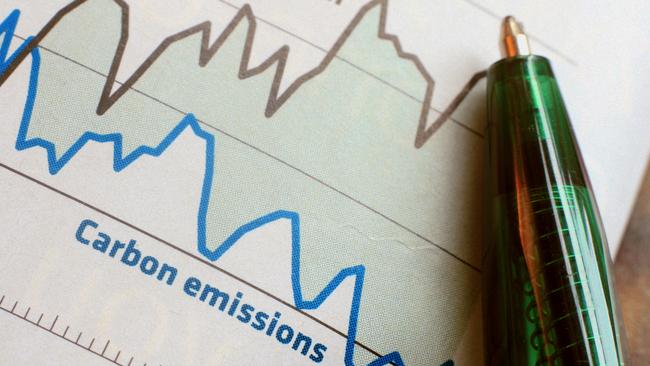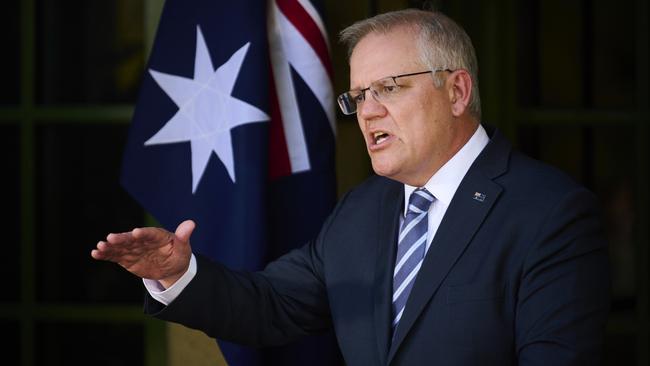
With a few extra easily introduced strategies Morrison can also go to a 46 per cent reduction on the 2030 target. This week cabinet will meet to debate a national emissions reduction plan, but as I will explain below, it’s an irrelevancy. It’s too late and not required in the PM’s Biden-Johnson-Glasgow communication.
Last week under the heading “Scott Morrison must attend COP26 in Glasgow and take a package of carbon reduction measures” I linked Australia adopting a Biden-Johnson-style emissions strategy to the AUKUS alliance, which is vital for Australia’s long-term security.
In that context at that time I believed a national emissions strategy was vital for our defence. Then over the weekend, the penny dropped. We need a national “outcome” rather than a hastily prepared national “strategy” and we have already set in place the commitments for that “outcome”.
We also need to face the reality that many in the federal cabinet do not want to be forced into a strategy that splits the Coalition. The solution I now put forward means we can enhance our defence security without a cabinet split.
On the emissions front in the last few years we have seen the Australian Constitution being implemented in the way our founding fathers envisaged.
One by one each state in Australia has responded to their voters and committed their governments to zero emissions in 2050. And both territories have joined them, with the ACT going further. This is a truly remarkable and national unifying event because three of the states are governed by Liberal parties and three by the ALP. And the state actions go further.
Three of the governments – Victoria, NSW and SA – plus the NT and ACT have committed a 50 per cent reductions in emissions by 2030 (there is wriggle room in Victoria) which represent roughly half Australia’s total emissions. The reminder of the mainland states have committed to a 30 per cent reduction. Combine the two and we’re talking about a rough 40 per cent national committed emission reduction by 2030.
Some of the governments have taken the policy to an election and it has been approved by the voters.

Morrison will need to explain to Biden and Johnson that our federation combines six independent state governments that each have separate governors reporting independently to the Queen. Almost all the levers to reduce carbon, including power generation, gas and power distribution, land control, building and transport regulations, infrastructure etc, are in the hands of the states. The Commonwealth’s power is concentrated around money, defence, foreign affairs and telecommunications. A Morrison commitment to Biden, Johnson and Glasgow will come from the Australian population via powerful state governments.
The howls of protest from the politicians and public servants in Canberra will be loud and vicious. They will describe this as a disintegration of the federation. But actually it is not. This is the restoration of the federation that was set up by our founding fathers.
In many ways the post-war decades were an aberration where the Commonwealth via the court system used its money powers to dominate the states. But the states, including Queensland, picked the global embrace of emissions reduction faster than Canberra and have used their wide powers to take control.
They simply are not going to change their well-established plans because the Australian cabinet has a meeting.
The task of Scott Morrison is help the states co-ordinate their the emissions reduction plans so that we have a proper “national outcome” and not a series of conflicting actions that leave Australia with a chaotic mess along the lines of the different railway gauges. A co-ordinated “national outcome” will not be achieved by lecturing the states and trying to stuff a divided Cabinet’s idea of a national policy down their throats. It will require real Prime Ministerial skills.
But, Scott Morrison, let me give you several ways to achieve co-ordination.
• Communicate now with Biden, Johnson and Glasgow as the leader of the nation. Don’t wait.
• Recognise that the banks, superannuation funds and the Business Council of Australia have moved in behind the states but desperately want you to show leadership to make sure we get a co-ordinated national outcome. Once you are in the negotiating process Commonwealth money can be used to lock states into co-ordinated outcomes. But don’t start with money and lectures.
• The actions of the banks, super funds and BCA plus the states means a 46 per cent reduction by 2030 is achievable and should be in your communication.
• The biggest opportunity of all is to revolutionise Australian farming and dramatically increase the rewards for farmers via farming carbon credits, which has the support of both parties.
The enabling legislation was actually introduced by the Kevin Rudd government and Tony Abbott improved the legislation. But then it then fell into an abyss partly because the simple fact is that the Commonwealth has great difficulty carrying out actions. This applies to implementing farming carbon credits (via plants to store carbon in the soil) as much as it does to infrastructure. The days of Commonwealth instructing the states what to do in farming credits and what infrastructure is needed and expecting them to follow are over. Leadership is required.
• When Daniel Andrews is no longer Victorian premier then it will be possible to stop Yallourn brown coal mining but replace it with the world’s most remarkable gas deposit – the deep Gippsland low-cost onshore gases which are dissolved in water. That water can be used for carbon reduction in many South Gippsland areas stretching from the Strzelecki Ranges, helping to make the gas close to carbon-neutral and slashing emissions. The project could kickstart farming credits around the nation. It will deliver Latrobe Valley and national prosperity plus boost Gippsland farm income.
Morrison has to help states achieve emissions objectives. He can do this but some of his ministers have a lot of learning to do.






Prime Minister Scott Morrison can today promise US President Joe Biden and UK Prime Minister Boris Johnson plus the Glasgow summit that Australia will commit to net zero emissions by 2050 and at least a 40 per cent reduction by 2030.